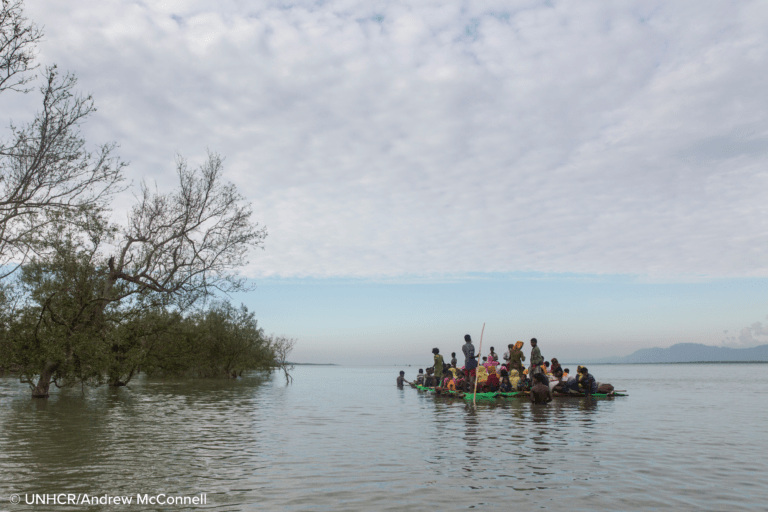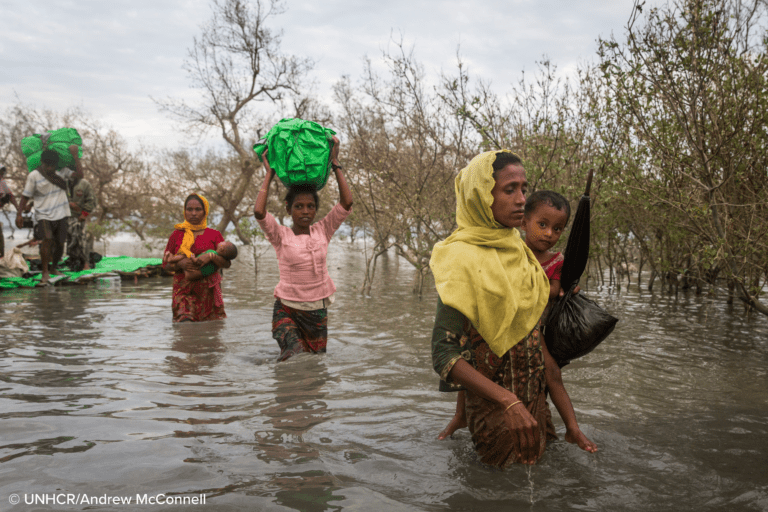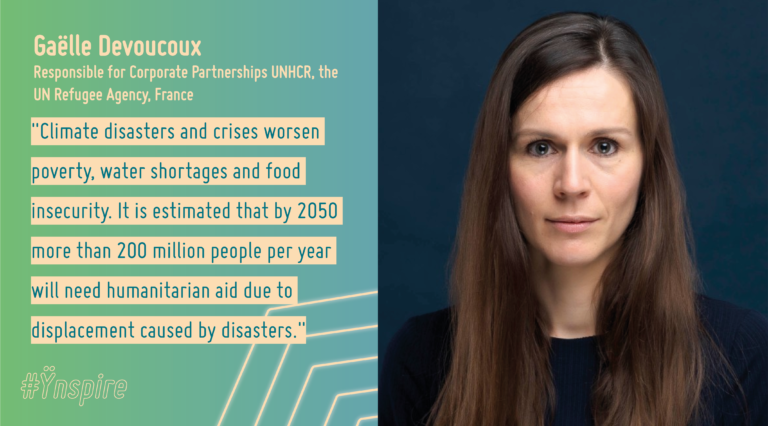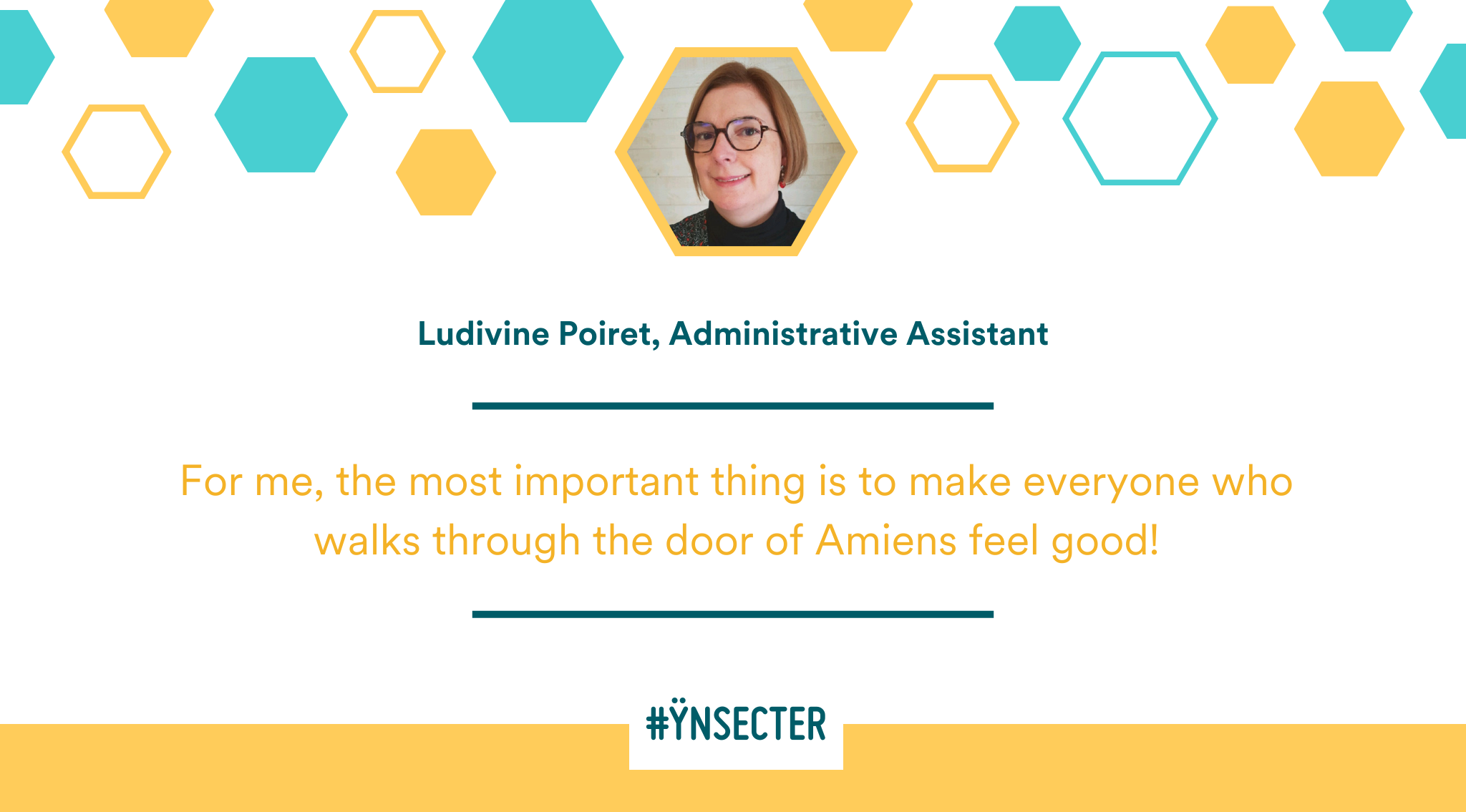Can you tell us what your work involves and how you came to work in this field?
During my studies, I graduated from a business school where I specialised in social entrepreneurship. Afterwards, I worked in India and Lebanon and worked directly with vulnerable populations. When I returned to France, I joined the social finance sector. The international scope remained in my mind, so I oriented toward global organisations such as Action against hunger and the UNHCR, the UN Refugee Agency where I work today to initiate and build partnerships with French companies. Our organisation, created in 1950, is dedicated to protecting the fundamental rights of refugees, bringing them vital aid and helping them to build a better future. My work involves identifying interested partners to develop support for the current major forced displacement crises.
What is a “forcibly displaced person”? Does it apply to every case?
By “forcibly displaced persons” we mean people who are forced to flee their homes due to persecution, for example, due to political views, sexual orientation or religion. When we talk about forced displacements we are referring to situations where people have to cross a border, or have been internally displaced in their country of origin. By mid-2021, more than 84 million people were in this situation. In 2020, most of these people came from Syria and Afghanistan but also Venezuela and Myanmar. They were hosted in countries such as Turkey, Pakistan, Colombia and Germany. Most of these people flee to neighbouring countries.

When do you intervene?
UNHCR, the UN Refugee Agency is an international organisation employing 18,000 staff across 130 countries. It means that, in most cases, we are already present in a country when a humanitarian crisis breaks out. In 2021 we were involved in around forty crises in thirty countries – twice as many as a few years ago. On a daily basis, we split consider two types of crises: long-term crises, such as Syria and Afghanistan; and emerging crises, such as global pandemics and climate emergencies. Although they may be sudden, we try to anticipate these crises as much as possible. First, we work to build local partnerships to be able for our field teams to respond to any crisis. We plan our emergency protocol to make our intervention as quick and relevant as possible.
At the end of February 2022, the war in Ukraine sent a shock wave, forcing thousands of people to leave their homes without warning. UNHCR, the UN Refugee Agency brought its humanitarian support tothe affected populations. Can you tell us more about the management of this (still) ongoing crisis?
The crisis in Ukraine has already affected more than 14 million people to date, 6,8 million of whom have had to flee their country. UNHCR, the UN Refugee Agency has been present in Ukraine since 1994 and has already been involved in implementing humanitarian solutions. At the start of this crisis, we settled an emergency response plan for around 4 million refugees in Ukraine’s neighbouring countries. The current crisis has overwhelmed this projection. Our work must ensure that internally displaced people and refugees find adequate support and assistance when they arrive in a new place. 90% of those fleeing Ukraine are women and children. We are working to protect people against trafficking and sexual violence and to ensure that children and the most vulnerable are safe… Everything must be done to deliver an urgent and quality response to the expressed needs.
Today, the latest IPCC report indicates that we are advancing towards an unprecedented climate crisis. Are you prepared for this type of global emergency? How will you react in the face of climate disruption?
The climate emergency is clearly one of the major concerns of our time. Climate change often exacerbates forced displacements of populations from countries that contribute the least to climate change. Climate disasters and crises worsen poverty, water shortages and food insecurity. It is estimated that by 2050[1] more than 200 million people per year will need humanitarian aid due to displacement caused by disasters. UNHCR, the UN Refugee Agency has a special advisor on climate action and follow a specific policy framework on these issues. Reducing our carbon footprint and developing projects aiming at protecting the environment are also among the UNHCR’s top priorities for 2022 and beyond. For example, UNHCR is deploying programs connecting infrastructures to solar energy and fighting against deforestation.
Can you tell us more about “climate refugees”?
The term “climate refugee” does not actually exist in international law, however, recent directives published by UNHCR show that under the 1951 Refugee Convention “certain people may be recognised as refugees where the adverse effects of climate change or disaster interact with conflict and violence.” Some regional legal frameworks also recognise that the effects of climate change may be considered as “events seriously disturbing public order.”

What can we do at an individual level?
Observing the great solidarity that appears when there is a major humanitarian crisis is truly inspiring. Ukraine is an example: many countries created chains of solidarity to mobilise financial and in-kind donations for those fleeing their homes. However, the best way to help such vast numbers of forcibly displaced people who have varying needs from one part of the world to the other, and who are often traumatised by an exhausting exile, is to give financial support to organizations that are already working on the ground. Funds can be used to set up cash assistance schemes, as in Poland, for example. This unrestricted financial assistance is set up in some host countries: people are redirected to registration centers where an interview is conducted to understand people’s prior vulnerabilities – whether they have children to take care of, whether they have disability issues or whether they are responsible for elderly people. Through this assessment, the person might then receive financial assistance directly from an ATM to finance her daily needs. Beyond the efficiency of this type of aid which can be deployed on a very large scale, the cash assistance scheme restores an essential element for forcibly displaced families: their dignity.
For more information about UNHCR, the UN Refugee Agency :
Official website | Twitter | Facebook | Instagram
[1] Source: International Federation of Red Cross and Red Crescent Societies (IFRC), “The Cost of Doing Nothing: The Humanitarian Price of Climate Change and How It Can Be Avoided” (Geneva, 2019).





